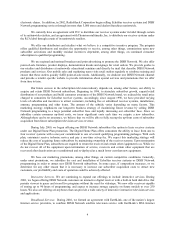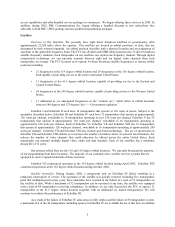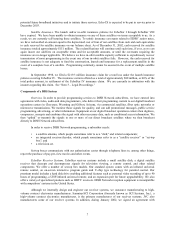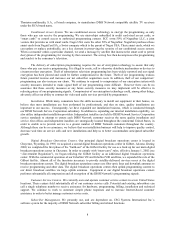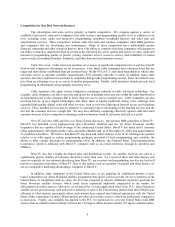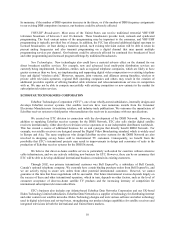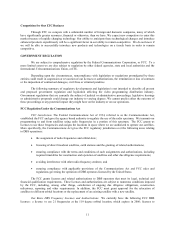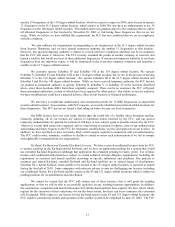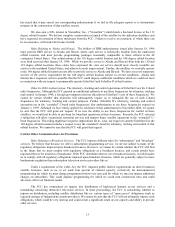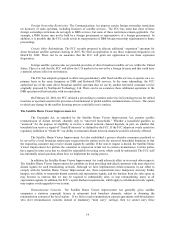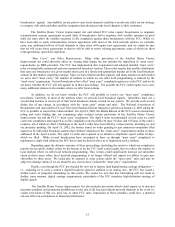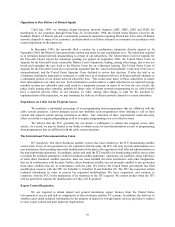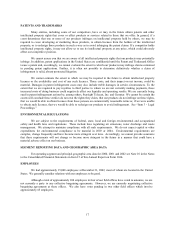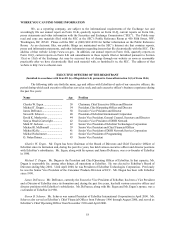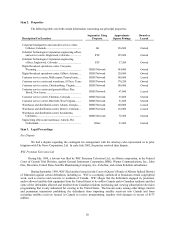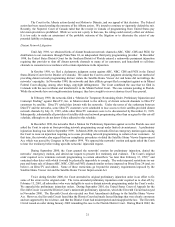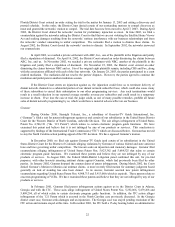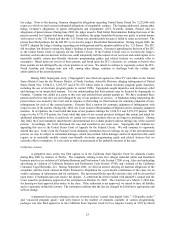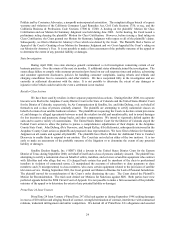Dish Network 2002 Annual Report Download - page 16
Download and view the complete annual report
Please find page 16 of the 2002 Dish Network annual report below. You can navigate through the pages in the report by either clicking on the pages listed below, or by using the keyword search tool below to find specific information within the annual report.14
Foreign Ownership Restrictions. The Communications Act imposes certain foreign ownership restrictions
on licensees of radio spectrum, including licensees of satellite services. The FCC has ruled that most of these
foreign ownership restrictions do not apply to DBS services, but some of these restrictions remain applicable. For
example, a DBS license may not be held by a foreign government or representative of a foreign government. In
addition, it is possible that the FCC could revisit its interpretation of DBS foreign ownership requirements in future
proceedings.
Certain Other Rulemakings. The FCC recently proposed to allocate additional “expansion” spectrum for
direct broadcast satellite operators starting in 2007. We filed an application to use those expansion frequencies on
March 28, 2002. There can be no assurance that the FCC will grant our application to use these expansion
frequencies.
Foreign satellite systems also are potential providers of direct broadcast satellite service within the United
States. There is a risk that the FCC will allow the U.S market to be served by a foreign licensee and this could have
a material adverse effect on our business.
The FCC has adopted a proposal to allow non-geostationary orbit fixed satellite services to operate on a co-
primary basis in the same frequency as DBS and Ku-based FSS services. In the same rulemaking, the FCC
authorized use of the same direct broadcast satellite spectrum that we use by another terrestrial consumer service
originally proposed by Northpoint Technology, Ltd. There can be no assurance these additional operations in the
DBS spectrum will not interfere with our operations.
On February 28, 2002, the FCC initiated a proceeding to examine and revise its licensing process for orbital
locations or spectrum used for the provision of international or global satellite communications services. The extent
to which any change in the satellite licensing process could affect us is unclear.
The Satellite Home Viewer Improvement Act
The Copyright Act, as amended by the Satellite Home Viewer Improvement Act, permits satellite
retransmission of distant network channels only to “unserved households.” Whether a household qualifies as
“unserved” for the purpose of eligibility to receive a distant network channel depends, in part, on whether that
household can receive a signal of “Grade B intensity” as defined by the FCC. If the FCC adopts an overly restrictive
regulatory definition of “Grade B,” our ability to retransmit distant network channels would be adversely affected.
The Satellite Home Viewer Improvement Act also established a process whereby consumers predicted to
be served by a local broadcast station may request that the station waive the unserved household limitation so that
the requesting consumer may receive distant signals by satellite. If the waiver request is denied, the Satellite Home
Viewer Improvement Act permits the consumer to request an actual test in certain circumstances. Certain parties
have argued in some cases that we should be responsible for testing costs, which could be substantial. The FCC staff
has informally raised questions about how we implement the testing process.
In addition, the Satellite Home Viewer Improvement Act could adversely affect us in several other respects.
The Satellite Home Viewer Improvement Act prohibits us from providing individual customers with more than two
distant signals for each broadcasting network. Although we have implemented certain measures in our effort to
comply with the Satellite Home Viewer Improvement Act, these requirements have hampered, and may further
hamper, our ability to retransmit distant network and superstation signals, and the burdens from the rules upon us
may become so onerous that we may be required to substantially alter, or stop retransmitting, many or all
superstation signals. In addition, the FCC’s sports blackout requirements, which apply to all distant network signals,
may require costly upgrades to our system.
Retransmission Consents. The Satellite Home Viewer Improvement Act generally gives satellite
companies a statutory copyright license to retransmit local broadcast channels, subject to obtaining the
retransmission consent of the local station. If we fail to reach retransmission consent agreements with broadcasters
who elect retransmission consents instead of mandatory “must carry” carriage, then we cannot carry these


